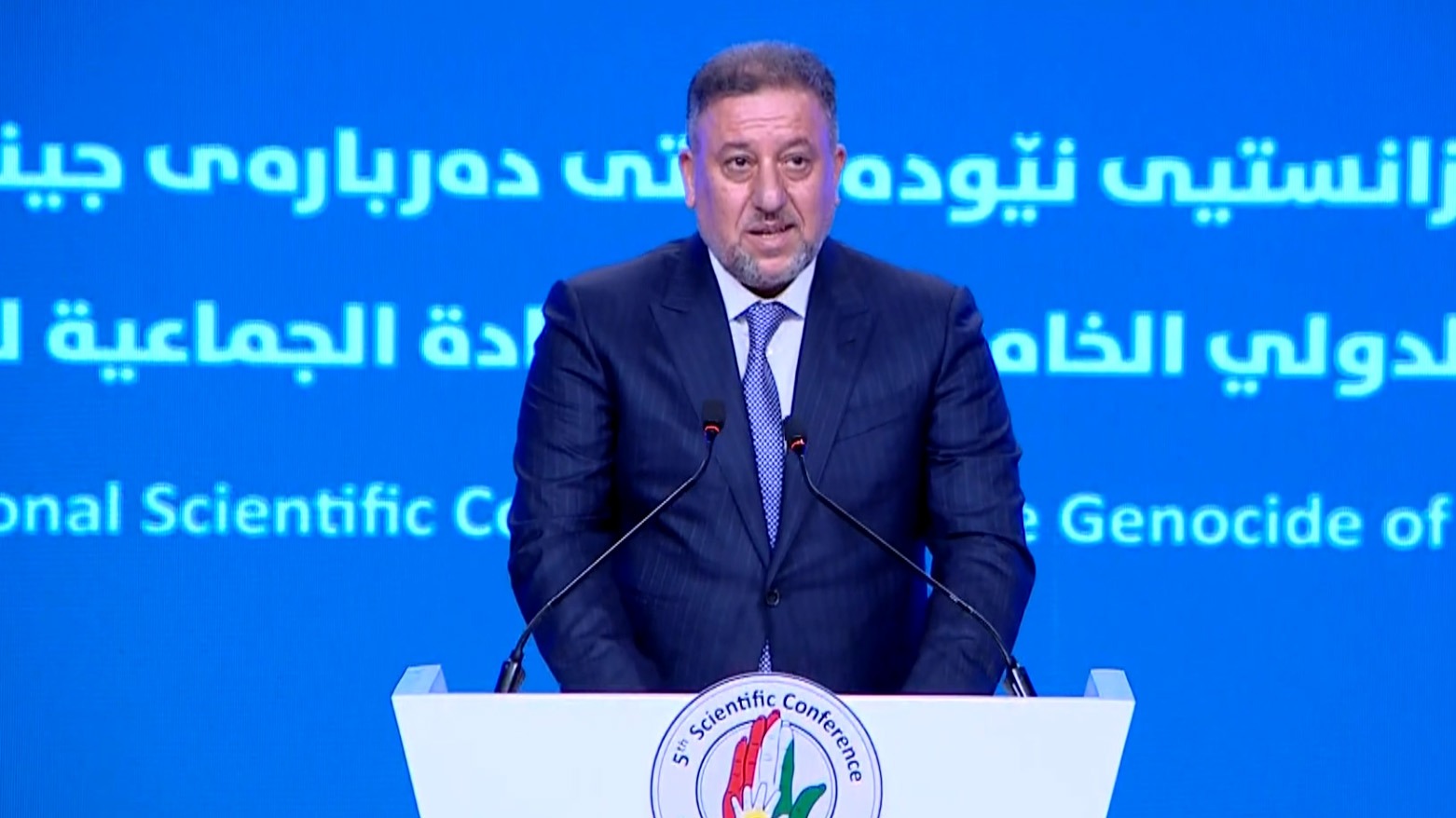'The Kurdish Nation Chose Forgiveness Over Revenge After the Anfal Tragedy,' Says Iraqi Politician
Iraqi politician Khamis al-Khanjar called for justice and lessons from the Anfal campaign, praised Kurds’ resilience, and President Barzani’s leadership.

ERBIL (Kurdistan24) — The fifth International Scientific Conference on the Kurdish Genocide began on Tuesday in Duhok, with the attendance of President Masoud Barzani and Kurdistan Region Prime Minister Masrour Barzani.
The two-day event brings together academics, political figures, and survivors to reflect on the crimes committed against the Kurdish people and to highlight the importance of preserving collective memory.
During the opening session, Khamis al-Khanjar, head of AL-Siyada Alliance in Iraq, delivered a heartfelt speech in which he described his deep emotional response after viewing footage and images of the genocide alongside President Barzani.
“Those scenes caused me great pain,” he said. “I realized how vital it is for us to learn from the Anfal campaign and the mass atrocities committed against the Kurdish nation.”
Al-Khanjar emphasized that from the earliest days of their struggle, Kurdish revolutionaries believed in the path of righteousness and freedom—not in oppression or bloodshed.
“The living among these people are those who, despite all the suffering, continue to stand tall. This is what defines the Kurdish nation,” al-Khanjar added.
Calling for global justice and an end to oppression, he urged nations to abandon policies of domination and aggression. “Justice must be the foundation of power. Nations endure by embracing fairness, tolerance, and accountability,” he said.
Al-Khanjar also expressed admiration for the Kurdish people’s endurance and moral strength, saying, “What I’ve learned today is that this great nation harbors no feelings of revenge. Instead, it has chosen forgiveness and made a profound sacrifice for the sake of life. May God bless these noble people.”
He concluded his remarks by quoting the Prophet Muhammad, peace be upon him: ‘If the leader is righteous, the people will be righteous.’ “This applies perfectly to President Barzani,” al-Khanjar said.
In his address at the conference, President Masoud Barzani delivered one of the most powerful and emotional remarks of the conference, underscoring that the Anfal was not merely a crime against the Kurdish people but a crime against humanity itself.
He emphasized that the memory of those who perished must never fade and that the living bear a sacred duty to seek justice on their behalf. “We will never allow the sacrifices of our people to be forgotten,” Barzani declared, calling on the international community to formally recognize the Anfal as genocide.
He stressed that true peace can only be achieved through acknowledgment, accountability, and respect for human dignity. Barzani’s words resonated deeply with the audience as he reaffirmed that the Kurdish nation, despite enduring immense suffering, has chosen forgiveness over vengeance and continues to stand as a symbol of resilience and moral strength in the face of oppression.
The Fifth International Scientific Conference on the Recognition of the Kurdish Genocide, held this week in Duhok, represents far more than an academic gathering — it is part of a decades-long national quest for justice and remembrance.
The conference, organized jointly by the Kurdistan Regional Government’s (KRG) Ministry of Higher Education and Scientific Research and the Ministry of Health, aims to compile a scientifically grounded record of the atrocities committed during the Anfal Campaign and other genocidal operations against the Kurdish people.
By documenting the crimes, identifying mass graves, and verifying evidence through modern research methods, the initiative seeks to build an irrefutable foundation for international recognition and historical accountability.
The Anfal Campaign, carried out by Saddam Hussein’s Ba’athist regime between 1987 and 1988, remains one of the darkest chapters in modern Middle Eastern history. Over 182,000 Kurds — men, women, and children — were systematically rounded up, executed, or disappeared.
Thousands of villages were destroyed, farmlands were razed, and entire communities were wiped out in a calculated attempt to eradicate Kurdish identity. The use of chemical weapons, most infamously in the city of Halabja, shocked the conscience of the world but failed to bring timely justice.
The atrocities were not isolated; they were part of a broader pattern of state violence against the Kurds, beginning with the persecution of the Faili Kurds in the 1970s and culminating decades later in the genocide of the Yazidis by ISIS in 2014.
For the Kurdistan Region, the legacy of these crimes remains an open wound — but also a source of collective strength. Through the work of institutions, researchers, and survivors, the Kurdish people continue to transform tragedy into testimony, ensuring that the memory of Anfal serves as both a moral warning and a foundation for national unity.
President Masoud Barzani’s call for justice, restitution, and remembrance reflects not only a demand for legal recognition but also a reaffirmation of Kurdish dignity and humanity.
The Duhok conference thus stands as a powerful reminder that remembrance is resistance — and that the struggle for justice is, above all, a struggle for peace built on truth.